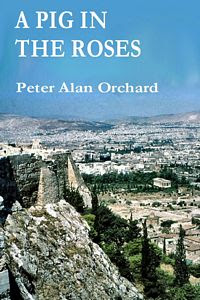As I wrote my ancient Athens mystery, A Pig in the Roses, I grew rather fond of the hero's family: Diokles himself, the determined but harrassed merchant with a lot on his mind; his wife Helike, a bustling country girl making a go of city life; their young daughter Xanthippe, bright-eyed and curly-haired, desperate to achieve some grown up dignity in spite of the activities of her much younger brother Euphemos, a self-absorbed bundle of chaos.
One of the elements I tried to maintain in what is in places quite a dark book - it contains several deaths and some murky social undertones - was the picture of a normal family coping with a desperate situation while trying to maintain their normality. There was no criminal investigation in ancient Greece, and it was the duty of the family to pursue an offender and bring cases to court, so Diokles is knocked sideways when his wife's uncle Makron, earning a living in town as a stonemason and living with his hypochondriac ex-slave mistress in Diokles' house, is hauled before a magistrate and accused of murdering his brother, an elderly farmer.
The book is set in 431 BC, at the beginning of the Peloponnesian War between Athens and Sparta, a time of country folk abandoning their villages to cram themselves into every available living-space in Athens, of tensions and divided loyalties. The chain of events involves several murders and all the family becomes involved. Diokles bears the brunt of it, with his persistence, trading contacts and tendency to jump in with both feet, but Helike makes important contributions through her dealings with other wives and spiky encounters with another key figure, Melitta, a young Samian courtesan.
Xanthippe and Euphemos, too, have their parts to play, and it was involving the children which made me think there was a story for young readers to be made out of the family, or characters based on them. The result was The House on Athene Street, a 10,000-worder for the 9-12s. This is a much more straightforward plot. Those who read both books will recognise the family, but most of the names are changed and the hero is an elder brother, the 13-year-old Hermippos, created for the children's story. Athene Street keeps the social context, ditches the politics and goes for a kidnap and chase plot involving the youngest child, the Egyptian girl Tiya, who keeps a perfume-stall, Tiya's uncle Wenamun, a length of rope, a pottery horse and rider and a stroppy red-head up a tree. Hermippos, naturally, saves the day, with lessons learnt about loyalty, bravery, co-operation, difference and the persistence of small brothers.
The difference in writing between the two? Not much, really. The Pig is much the more complex and has elements which children will not (probably should not) follow, but still qualifies as a 'cozy'. The parents are seen in a protective role in Athene Street, with the children to the front of the action, and nobody comes to much harm except the villain's dignity.
Both books are Smashwords titles, are available in all the usual formats and are scheduled to appear at the main ebook sellers as part of Smashwords' premium programme. All the details, summaries, buy links and excerpts are on my website, http://www.peteralanorchard.net/, and my Smashwords page.


1 comment:
Hi Peter - I've really enjoyed both your ancient Greek books. I particularly like them for the social detail and the characters.
Post a Comment